Vernor Vinge, October 2, 1944 — March 20, 2024
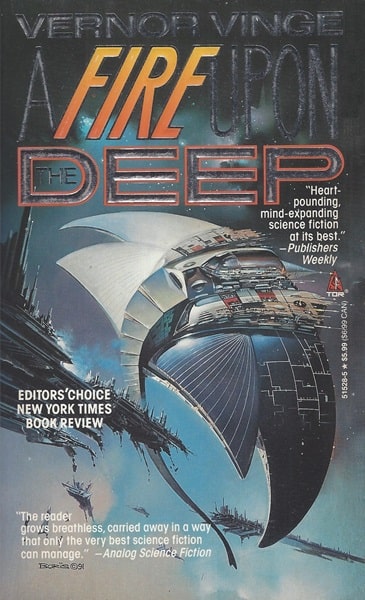 |
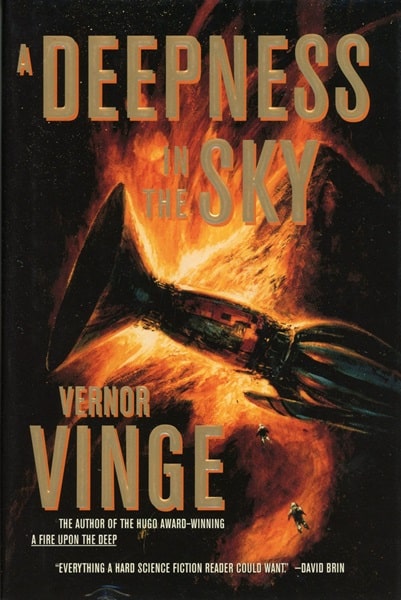 |
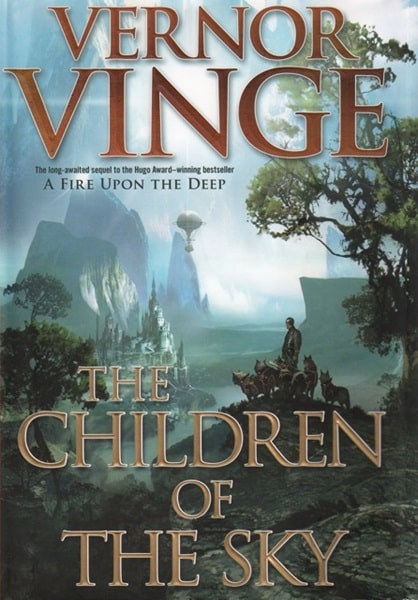 |
The Zones of Thought trilogy: A Fire Upon the Deep (Tor paperback reprint,
February 1993), A Deepness in the Sky (Tor, March 1999), The Children of the Sky
(Tor, October 2011). Covers by Boris Vallejo, Bob Eggleton, Stephan Martiniere
Vernor Vinge died on March 20, 2024, after several years suffering from Parkinson’s Disease. (I was aware that he had retired from writing, though I didn’t know about his illness, and part of me had hoped for one more novel or some more short fiction.) His last substantial work was the third Zones of Thought novel, The Children of the Sky, in 2011, though he did publish a couple of short-shorts in Nature, the last being “Legale” in 2017.
The first Vinge story I read must have been his first published story, “Apartness” (New Worlds, June 1965), a powerful indictment of South Africa’s apartheid regime via an ironic SF device. He continued to write occasional stories over the next few years. (His day job was as a Professor of Mathematics and Computer Science, and he made significant contributions to those fields.)
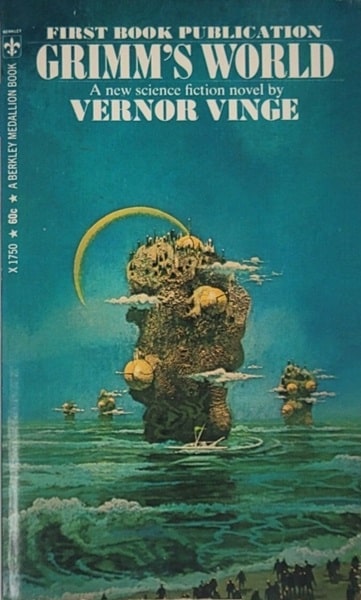 |
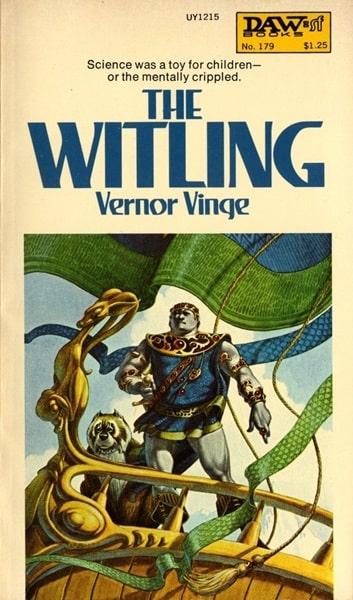 |
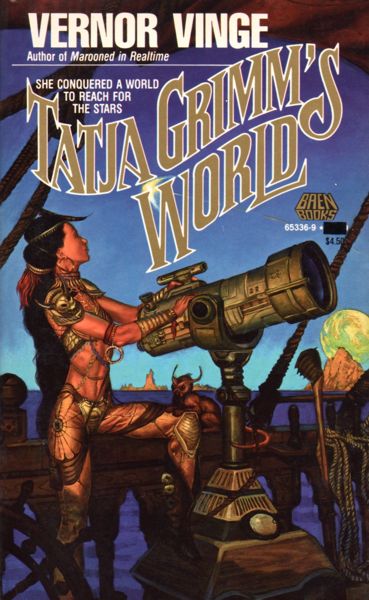 |
Grimm’s World (Berkley Medallion, August 1969), The Witling (DAW, January 1976),
Tatja Grimm’s World (Baen Books, July 1987). Covers by Paul Lehr, George Barr, Tom Kidd
His first novel was Grimm’s World (1969), an expansion of his Orbit 4 piece “Grimm’s Story,” and his second was The Witling (1976). By the late ‘70s I was taking notice of him, partly perhaps because I recognized him as the husband of Joan Vinge, who was doing very exciting work herself, and also after reading stories like “The Peddler’s Apprentice” (a collaboration with Joan) and a Grimm’s World sequel, “The Barbarian Princess”. (That story and Grimm’s World were published together as Tatja Grimm’s World.)
However, it was in 1981 that he came to wider attention with the classic novella “True Names,” first published as the last of Dell’s Binary Star series, which featured pairs of short novels or novellas, mostly originals. “True Names” was paired with George R. R. Martin’s “Nightflyers.” Both stories earned Hugo nominations (“Nightflyers” for its 1980 Analog appearance.) “True Names” is one of the first stories to present a fully realized “cyberspace,” and as such it is regarded as a key precursor to the cyberpunk subgenre. (Though it is less “punk” than many of the later stories it inspired.)
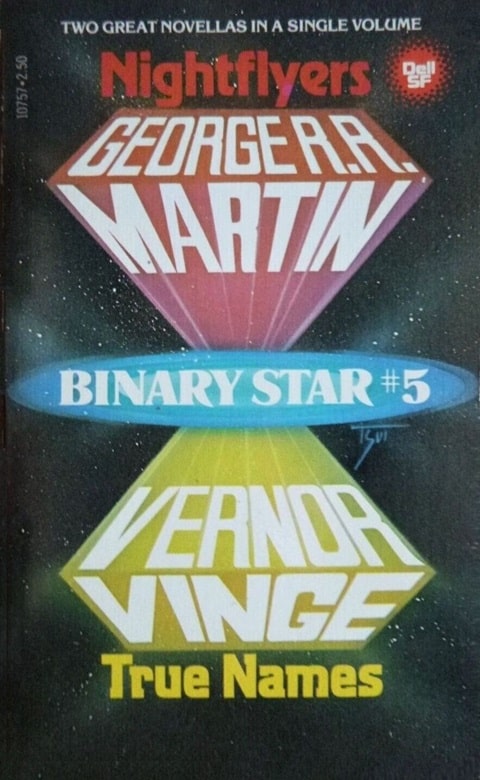 |
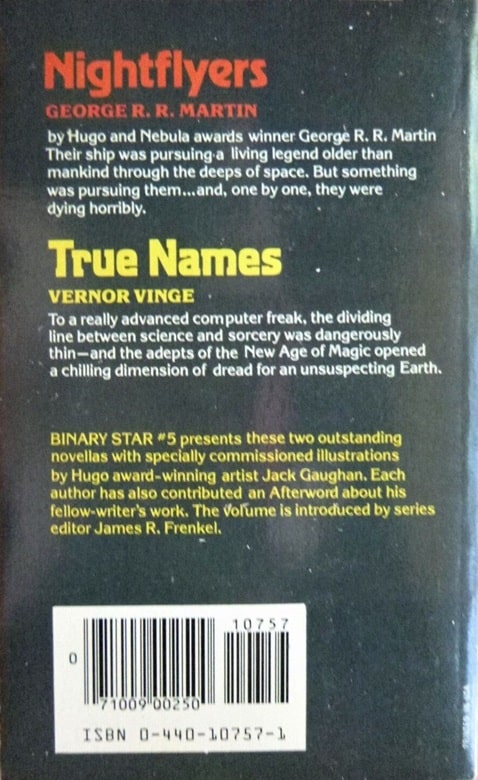 |
Binary Star #5, edited by James R. Frenkel (Dell, February 1981). Cover by George Tsui
Vinge published a couple of fine novels in the 1980s (The Peace War and Marooned in Realtime, about “bobbles” – stasis spheres that protected anything inside them from any outside influence, but which also froze time, so that in essence the stuff inside the spheres traveled forward in time) but it was his novels of the 1990s that cemented his place in SF history. These are A Fire Upon the Deep (1992) and A Deepness in the Sky (1999).
Both novels won Hugo awards. Both postulate a universe divided into “Zones of Thought,” such that near the center of a galaxy, in the “Unthinking Depths,” no intelligence is possible, somewhat farther out is the “Slow Zone,” where ordinary human intelligence is achievable; closer to the edge of the galaxy is the “Beyond,” where significantly greater intelligence arises, which has effects such as enabling FTL travel; and outside a galaxy is the “Transcend,” where, in essence, the Singularity reigns.
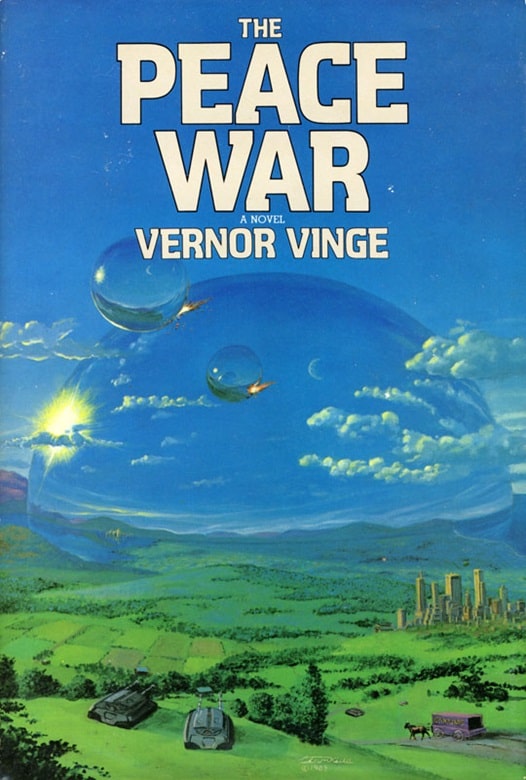 |
 |
The Peace War (Bluejay Books, August 1984) and Marooned in Realtime
(Bluejay Books, September 1986). Covers by Tom Kidd
The Singularity, you say? What is that? That was the subject of an extremely influential, if controversial, paper that Vinge published in 1993, in which he suggested that computing power was advancing so steadily that in 30 years (which is to say, now!) computers would become aware and super intelligent, and humans (linked to computers) would also be super intelligent. As he put it, “Shortly after, the human era would come to an end.”
I find the “Zones of Thought” concept fascinating, and the stories Vinge set there are remarkable. He really reignited my Sense of Wonder. He wrote one additional novel in the series, his last novel, The Children of the Sky (2011). He also wrote a novella, published in 1988, set in a sort of beta version of that universe.
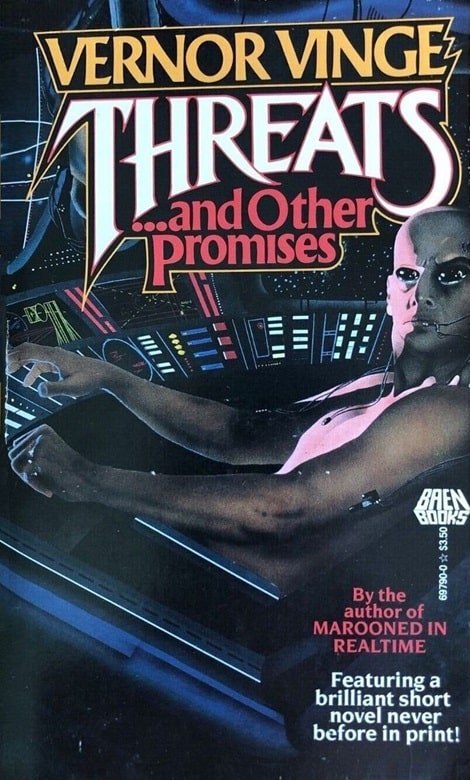 |
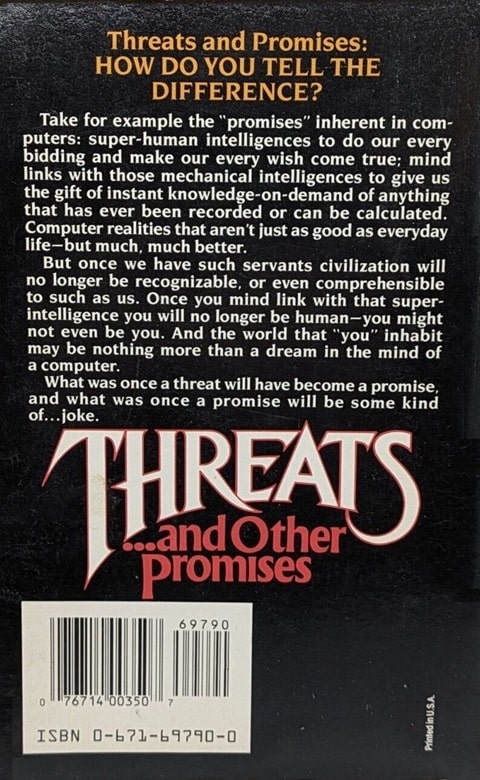 |
The collection Threats… and Other Promises, the first appearance of
the novella “The Blabber” (Baen, November 1988). Cover by E. M. Gooch
This story, “The Blabber,” is possibly my single favorite among all Vinge’s works (though A Deepness in the Sky is right up there.) In his introduction to “The Blabber,” in Threats … and Other Promises, Vinge wrote:
[This story] is a test flight into this new future. I hope you like it (since I’d like to do several novels here).
Vinge’s writing chops had continued to grow, and these stories combine fascinating scientific speculation, with wild and intriguing SFnal ideas, with real human (and alien) characters with emotionally powerful story arcs, and with effective and sometimes beautiful prose. There are moments of glory, of horror, and of tragedy in his stories, and moments of true awe.
Vinge won three more Hugos – for his 2006 novel Rainbows End, and for his 2001 and 2003 novellas, “Fast Times at Ridgemont High” and “The Cookie Monster.” His stories throughout rigorously examined scientific and computing concepts, intriguingly imagined near future effects of technology, but were also willing to postulate crazy, likely impossible concepts, such as the Bobbles and the Zones of Thought. He was not usually an overtly political writer, though his generally libertarian politics were noticeable (especially in the Bobbles stories) and his very first story starkly addressed apartheid.
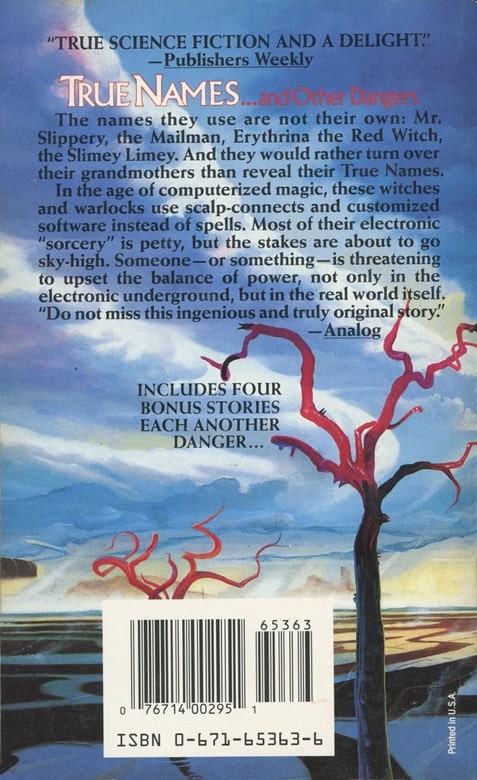 |
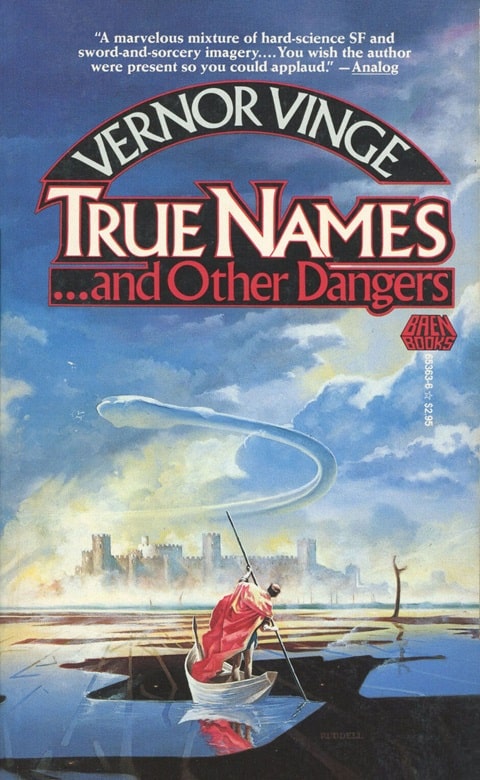 |
True Names … and Other Dangers (Baen, November 1987). Cover by Gary Ruddell
Vinge’s overall SF output was respectable but modest – some 30 stories and 8 novels. But his influence was outsized, both in the ideas expressed in his fiction (perhaps especially in “True Names”) and the ideas expressed in his nonfiction, especially the concept of the Singularity. And his best fiction was remarkable, as evidenced by his 5 Hugos and by such other stories as “True Names” and “The Blabber.”
He would definitely have been an appropriate SFWA Grand Master. I never had the chance to meet him, or talk to him, but his fiction seemed to be a conversation of its own. He will be profoundly missed.
Here are links to reviews of two of his best novels, from my blog.
Rich Horton’s last article for us was a review of Jacqueline Holland’s debut novel The God of Endings. His website is Strange at Ecbatan. Rich has written over 200 articles for Black Gate, see them all here.
Thank you for your thoughts on Vinge, Rich. He was an important author of my late teens and early 20s. I’m planning on reviewing his second novel The Whitling (I know it’s not one of his best!) in the next few months. I acquired it before he passed away.
I’m actually rereading it right now! Primarily because it’s the novel of his I’ve mostly forgotten!
Well, I look forward to your review — even if you conclude that it is middling to poor at best!
The Libertarian Futurist Society gave Vinge a Special Award for Lifetime Achievement in 2014 (other recipients have been Poul Anderson, L. Neil Smith, and F. Paul Wilson). I had the privilege of presenting it to him at a San Diego convention; I remember Vinge talking about how his political ideas had been influenced by David Friedman’s The Machinery of Freedom, and then Friedman, who was in the audience, saying that his own ideas had been influenced by Robert Heinlein’s The Moon Is a Harsh Mistress—a neat bit of indirect literary influence. (Friedman is the son of the very well known economist Milton Friedman). Vinge has also gotten LFS Best Novel awards for Marooned in Realtime and A Deepness in the Sky (my own favorite of his novels) and, retroactively, Hall of Fame Awards for his stories “True Names” and “The Ungoverned.” I agree that “True Names” was a prototype of cyberpunk before the genre was named—though it’s worth noting that where the cybernetic outlaws in Neuromancer were struggling with a huge (and Japanese) corporation, those in “True Names” were primarily up against the United States government and especially the IRS!
(If I had to pick a favorite shorter work, I think it would be “The Barbarian Princess,” with its mixture of whimsy and sorrow.)
I used to see Vinge regularly at fannish events in San Diego. I remember particularly the time when I was working on GURPS Future History, and he spent most of an hour talking with me about what he envisioned as the distinctive catastrophes of his hyperadvanced civilizations in A Deepness in the Sky, a very generous use of his time. It’s sad to look back now and remember that that was not long before he retired from writing. I admire Vinge’s writing and find his ideas fascinating, but I remember him also as an essentially civilized and generous human being. It’s sad that he’s no longer with us. Thank you for carrying his memory forward.